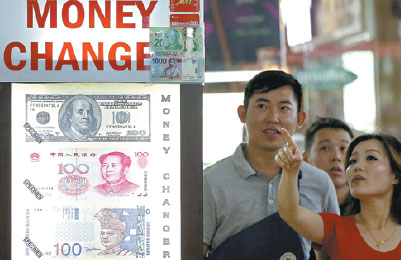Lion City poised for growth in renminbi offshore settlement
By Jiang Xueqing (China Daily) Updated: 2015-11-07 07:51
|
People check exchange rates at a moneychanger displaying a poster of the US dollar, the Chinese yuan and the Malaysian ringgit in Singapore on Aug 24. Reuters |
Singapore is now the second largest offshore renminbi center after Hong Kong, and still has huge potential for growth in the cross-border renminbi business, according to Stephen Kiang Wah Lee, executive director of global trade product management at DBS Bank Ltd.
"As a global commercial trading hub, the Asian headquarters for corporations from around the world, and a commodity trading and a financial center, Singapore has a ready pool of participants who can potentially tap into the renminbi as a trade settlement and trading currency," said Lee.
He expects trade settlement in offshore renminbi to pick up rapidly, as renminbi-denominated trade rises in tandem with increased trade flows between China and ASEAN, which are predicted to surpass $500 billion within two years.
"The implementation of China's Belt and Road Initiative, together with the Regional Comprehensive Economic Partnership, will facilitate trade and investment between China and ASEAN and drive the growth of renminbi usage.
"With the close trade links between Singapore and ASEAN member economies, the development of the renminbi as an international currency will speed up, with Singapore playing a particularly important role," he said.
Piyush Gupta, the chief executive officer of DBS Group Holdings, said it is logical for the yuan to find a natural home in Singapore, as the Lion City is a pivotal financial and foreign exchange center.
"The reality is that for finance and trade purposes, Hong Kong will always be the natural center for the yuan because most of China's trade tends to flow through there.





